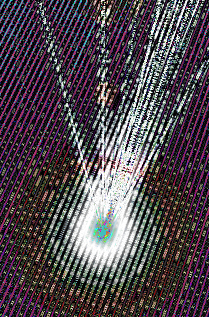Photons focused on big ideas
 Australian researchers are taking the smallest possible approach to some of our biggest questions.
Australian researchers are taking the smallest possible approach to some of our biggest questions.
Scientists at Griffith University and Singapore’s Nanyang Technological University have performed a ‘proof of principle’ experiment simulating hugely complex processes in the macroscopic world using quantum mechanics.
Professor Geoff Pryde, who led the project, says mind-bending processes like studying transportation systems, stock markets and the weather could be simulated using a “quantum hard drive”.
“Stephen Hawking once stated that the 21st century is the ‘century of complexity’, as many of today’s most pressing problems, such as understanding climate change or designing transportation system, involve huge networks of interacting components,” he said.
“Their simulation is thus immensely challenging, requiring storage of unprecedented amounts of data.
“What our experiments demonstrate is a solution may come from quantum theory, by encoding this data into a quantum system, such as the quantum states of light.”
Einstein once said that “God does not play dice with the universe,” rejecting the idea that quantum particles have some intrinsic randomness.
“But theoretical studies showed that this intrinsic randomness is just the right ingredient needed to reduce the memory cost for modelling partially random statistics,” says Dr Mile Gu, a member of the team who developed the initial theory.
In contrast with the usual binary storage system - the zeroes and ones of bits - quantum bits can be simultaneously 0 and 1, a phenomenon known as quantum superposition.
This freedom allows quantum computers to store many different states of the system being simulated in different superpositions, using less memory overall than in a classical computer.
The team constructed a proof-of-principle quantum simulator using a photon – a single particle of light – interacting with another photon.
They measured the memory requirements of this simulator, and compared it with the fundamental memory requirements of a classical simulator, when used to simulate specified partly random processes.
The data showed that the quantum system could complete the task with much less information stored than the classical computer– by a factor of 20 at its peak.








 Print
Print